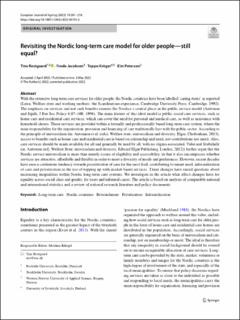| dc.identifier.citation | Rostgaard, T., Jacobsen, F., Kröger, T., & Peterson, E. (2022). Revisiting the Nordic long-term care model for older people—still equal? European Journal of Ageing, 19(2), 201-210. | en_US |
| dc.description.abstract | With the extensive long-term care services for older people, the Nordic countries have been labelled ‘caring states’ as reported (Leira, Welfare state and working mothers: the Scandinavian experience, Cambridge University Press, Cambridge, 1992). The emphasis on services and not cash benefits ensures the Nordics a central place in the public service model (Anttonen and Sipilä, J Eur Soc Policy 6:87–100, 1996). The main feature of this ideal model is public social care services, such as home care and residential care services, which can cover the need for personal and medical care, as well as assistance with household chores. These services are provided within a formally and professionally based long-term care system, where the main responsibility for the organization, provision and financing of care traditionally lays with the public sector. According to the principle of universalism (in: Antonnen et al. (eds), Welfare state, universalism and diversity, Elgar, Cheltenham, 2013), access to benefits such as home care and residential care is based on citizenship and need, not contributions nor merit. Also, care services should be made available for all and generally be used by all, with no stigma associated. Vabø and Szebehely (in: Anttonen (ed), Welfare State, universalism and diversity, Edward Elgar Publishing, London, 2012)) further argue that the Nordic service universalism is more than merely issues of eligibility and accessibility, in that it also encompasses whether services are attractive, affordable and flexible in order to meet a diversity of needs and preferences. However, recent decades have seen a continuous tendency towards prioritization of care for the most frail, contributing to unmet need, informalization of care and privatization in the use of topping up with market-based services. These changes have raised questions about increasing inequalities within Nordic long-term care systems. We investigate in the article what effect changes have for equality across social class and gender, for users and informal carers. The article is based on analysis of comparable national and international statistics and a review of national research literature and policy documents. | en_US |

